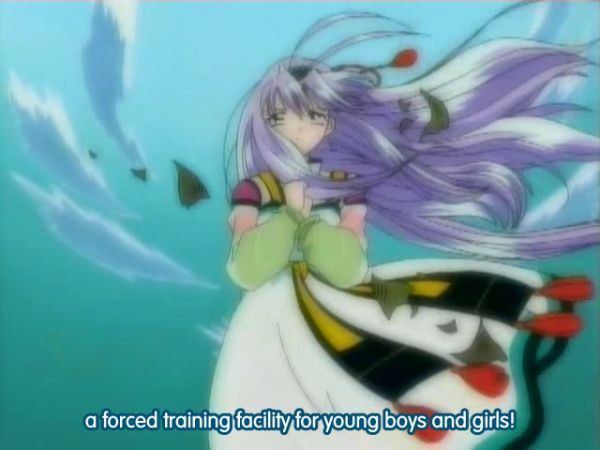
A forced training facility for young boys and girls! The Shugogetten, an ancient protector spirit, discovers a modern high school and decides it must be razed to the ground for the good of the poor prisoners. I am sure some of them would agree.
These days, most people go to school for a dozen years or more. And yet many have never given much thought to why we are receiving all this education. What is the purpose of education? What is education good for?
When we are small, we go to school because we are told to do so, and because everyone else does. Also, if the school is even reasonably good, it satisfies a natural instinct in children: Curiosity. (It also satisfies their social instinct – children, and many adults, get very uncomfortable if there are not other people around, preferably several other people.) It is also pretty obvious that reading and writing are useful skills, reading especially. Even comic books become better when you can read the speech bubbles!
At the other end of the long corridor of education, when you approach college, you probably have a specific career in mind. And even if it is not very specific, you probably believe that higher education improves your chance to get a job at all, but especially a well paid one. So a good many people see higher education as an investment: You spend time and money in the hope of earning more later, and (perhaps not least) get a job that is interesting and has social status, rather than hauling parcels at some warehouse for the next forty years or more.
And that’s where it usually stops, it seems to me. But that is to underestimate the value of education, and to miss one of its main purposes. Education, properly understood, aims to make us human.
That is not to say that we are not born human. But our human potential is to a large degree just that, potential. A child raised by wolves is actually highly unlikely to build a city (contrary to legend) or indeed experience any of the joys of civilization. Culture is mankind’s attempt to answer that terrible question that arose some time in the dimly lit prehistory, when a human first lifted its face, looked around, and thought: “I exist! And I know it! OMG what am I going to do with this discovery?”
Since then, the fact that we can think has been a constant source of trouble, and to this day some highly respectable friends of mine sit down regularly trying NOT to think, a process known as meditation. But if that was the sole purpose of meditation, then trees and stones would have us beat already at the starting line. Rather, in meditation we seek to reclaim our selves from the myriad distractions that draw and quarter us, consume us and scatter our ashes while we are still alive. Its purpose is to make us whole, a word related to both “healthy” and “holy”.
Now seems a good time to ask what side our education stands in this. Does it make us whole, healthy and holy (inviolate)? Or does it scatter us, pull us from side to side or to different sides at the same time, distract us, Â confuse us, remove us from our very selves?
This is not a rhetorical question, although sometimes it may seem so. Education can work in either of those two directions. And as we grow older, each of us has more and more responsibility for making sure we truly benefit from our education.
The philosopher James V. Schall has written a book to this effect, saying in its subtitle “How to acquire an education while still in college”, without too much irony. Â In the rush to become high-earning adults, it is easy to forget the curiosity that made our heart beat strongly on our way to our first school day all those years ago. And not all have been privileged with teachers who protected that flame of curiosity, fed it without overwhelming it, and encouraged us to eat knowledge and grow rather than just carrying it on our back as an ever heavier burden.
I might finish this with a brilliant conclusion, but that would defeat the purpose of writing it. Rather, this is the time for my thoughts to step aside so yours can emerge. If you are undertaking an education, or even educating others, it is time to ask yourself: Are you gathering or scattering?Are you building, and if so, what? Are you growing, and if so, who will you be when you are grown?
